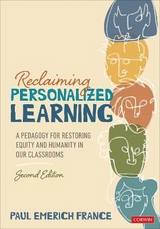
Reclaiming Personalized Learning
Corwin Press Inc (Verlag)
978-1-5443-6066-9 (ISBN)
For teacher and consultant Paul France, at first technology-powered personalized learning seemed like a panacea. But after three years spent at a personalized learning start-up and network of microschools, he soon realized that such corporate-driven individualized learning initiatives do more harm than good, especially among our most vulnerable students. The far-superior alternative? A human-centered pedagogy that prioritizes children over technology.
First, let’s be clear: Reclaiming Personalized Learning is not yet-another ed tech book. Instead it’s a user’s guide to restoring equity and humanity to our classrooms and schools through personalization. One part polemical, eleven parts practical, the book describes how to:
Shape whole-class instruction, leverage small-group interactions, and nurture a student’s inner-dialogue
Cultivate awareness within and among students, and build autonomy and authority
Design curriculum with a flexible frame and where exactly the standards fit
Humanize assessment and instruction, including the place of responsive teaching
Create a sense of belonging, humanize technology integration, and effect socially just teaching and learning—all central issues in equity
The truth is this: there’s no one framework, there’s no one tool that makes learning personalized–what personalized learning companies with a vested interest in profits might tempt you to believe. It’s people who personalize learning, and people not technology must be at the center of education. The time is now for all of us teachers to reclaim personalized learning, and this all-important book is our very best resource for getting started.
"This is a compelling and critically important book for our time. With rich stories of teaching and learning Paul France considers ways to create the most positive learning experiences possible."
- JO BOALER, Nomellini & Olivier Professor of Education, Stanford Graduate School of Education
"This brilliant book is a major contribution to the re-imagination of learning and teaching for the twenty-first century and should be essential reading for new and experienced teachers alike."
- TONY WAGNER, Senior Research Fellow, Learning Policy Institute
"In these troubled times, this book is more than a breath of fresh air, it is a call to action. Paul gives us an accessible and sophisticated book that explains how and why we should celebrate the humanity of every single student."
- JIM KNIGHT, Senior Partner of the Instructional Coaching Group (ICG) and Author of The Impact Cycle
Paul Emerich France is a National Board Certified Teacher, Reading Specialist, and author of five books on teaching, including Reclaiming Personalized Learning: A Pedagogy for Restoring Equity and Humanity in our Classrooms and Make Teaching Sustainable: Six Shifts Teachers Want and Students Need. He is also the author of Educational Leadership’s monthly column, “Make Teaching Sustainable.” France has authored well over 40 articles and blogs for various publications, including EdSurge, Edutopia, the International Literacy Association, and The Learning Professional. Paul spent ten years as an elementary school teacher, working with students in grades transitional kindergarten through fifth grade. He has experience in both public and independent schools, and now serves as a consultant and coach, working with teachers to both humanize their teaching and make it more sustainable, finding practices that benefit students, meanwhile helping teachers find sustainability in their workloads. In 2023, he founded Make Teaching Sustainable, an organization committed to helping schools find sustainable practices. Paul also hosts the Make Teaching Sustainable podcast, which can be found on all major streaming platforms. You can reach out to Paul by visiting http://www.maketeachingsustainable.org, emailing him at paul@maketeachingsustainable.org, or by following him on Instagram and Twitter at @sustainteaching.
Foreword by Carol Ann Tomlinson
Acknowledgments
About the Author
Introduction: The Paradox of Personalized Learning
SECTION ONE: FOUNDATIONS
CHAPTER 1. Personalization Myths
Myth 1: Personalizing Learning Means That Curriculum Must Be Individualized
Myth 2: Personalized Learning Must Be Interest-Based
Myth 3: Personalized Learning Is Only the Teacher’s Responsibility
Myth 4: Digital Technology Is Necessary to Personalize Learning
Myth 5: Digitally Driven Personalization Paves a Path to Equity
Responding to Industrialization
CHAPTER 2. The First Dimension: Shaping the Collective Conscious
Shaping the Collective Conscious
Connecting With Children
Maintaining the Spirit of the Workshop Model
Building on the First Dimension
CHAPTER 3. The Second Dimension: Leveraging Small-Group Interactions
The Dangers of Homogeneity
The Limits of Heterogeneity
The Hallmarks of a Strong Second Dimension
The Foundation of Individualization
CHAPTER 4. The Third Dimension: Nurturing a Child’s Internal Dialogue
Authentic Engagement and Intrinsic Motivation
The Power of Asking Why
Intrinsic Motivation in the Third Dimension
A Framework for Mediated Action
Nurturing the Inner Dialogue
The Intersectionality of Personalization
SECTION TWO: PEDAGOGY
CHAPTER 5. Cultivating Awareness
Defining Awareness
Self-Awareness
Six Guideposts for Cultivating Awareness in Children
Expanding Awareness
CHAPTER 6. Developing Agency and Autonomy
Balancing Autonomy and Authority
Ten Tips for Teaching Agency and Autonomy
Understanding the Inner World of a Child
CHAPTER 7. Designing Curriculum With a Flexible Frame
The Danger of Teaching Without Standards
The Flexible Frame
Supporting Humanized Personalization With Standards
Using the Flexible Frame to Personalize in Three Dimensions
CHAPTER 8. Humanizing Assessment
Cultures of Shame and Fear
The Origin of Fear and Shame
Campbell’s Law
Triangulating Humanized Assessment
Building the Frame to Weather the Storm
CHAPTER 9. Humanizing Instruction to Personalize Learning
Emergent Systems
The Foundation of Responsive Instruction
Hallmarks of Responsive Instruction
Engendering a Growth Mindset in Educators
SECTION THREE: EQUITY
CHAPTER 10. A Sense of Belonging
A Forum for Changing the World
The Threat to Belonging
A Culture of Scarcity and Fear
Equity Versus Equality
Technology Is Not the Solution
Inclusive Classroom Practices That Humanize Learning
A Work in Progress
CHAPTER 11. Humanizing Technology Integration
The Purpose of Technology
Where EdTech Falls Short
Reforming Education in the Image of Technology Elites
Four Principles for Humanizing Technology Integration
The Intersection of Education Technology and Social Justice
CHAPTER 12. Justice
What Is Justice?
Intersectionality and Identity
What Is Fair Is Not Always Equal
Personalization Is a Problem of Privilege
Tips for Socially Just Teaching and Learning
Restoring Equity and Reconnecting With Humanity
An Age of Empathy
References
Index
| Erscheinungsdatum | 18.10.2019 |
|---|---|
| Verlagsort | Thousand Oaks |
| Sprache | englisch |
| Maße | 177 x 254 mm |
| Gewicht | 710 g |
| Themenwelt | Schulbuch / Wörterbuch ► Unterrichtsvorbereitung ► Unterrichts-Handreichungen |
| Recht / Steuern ► Arbeits- / Sozialrecht ► Sozialrecht | |
| Recht / Steuern ► EU / Internationales Recht | |
| Sozialwissenschaften ► Pädagogik ► Allgemeines / Lexika | |
| ISBN-10 | 1-5443-6066-5 / 1544360665 |
| ISBN-13 | 978-1-5443-6066-9 / 9781544360669 |
| Zustand | Neuware |
| Informationen gemäß Produktsicherheitsverordnung (GPSR) | |
| Haben Sie eine Frage zum Produkt? |
aus dem Bereich



